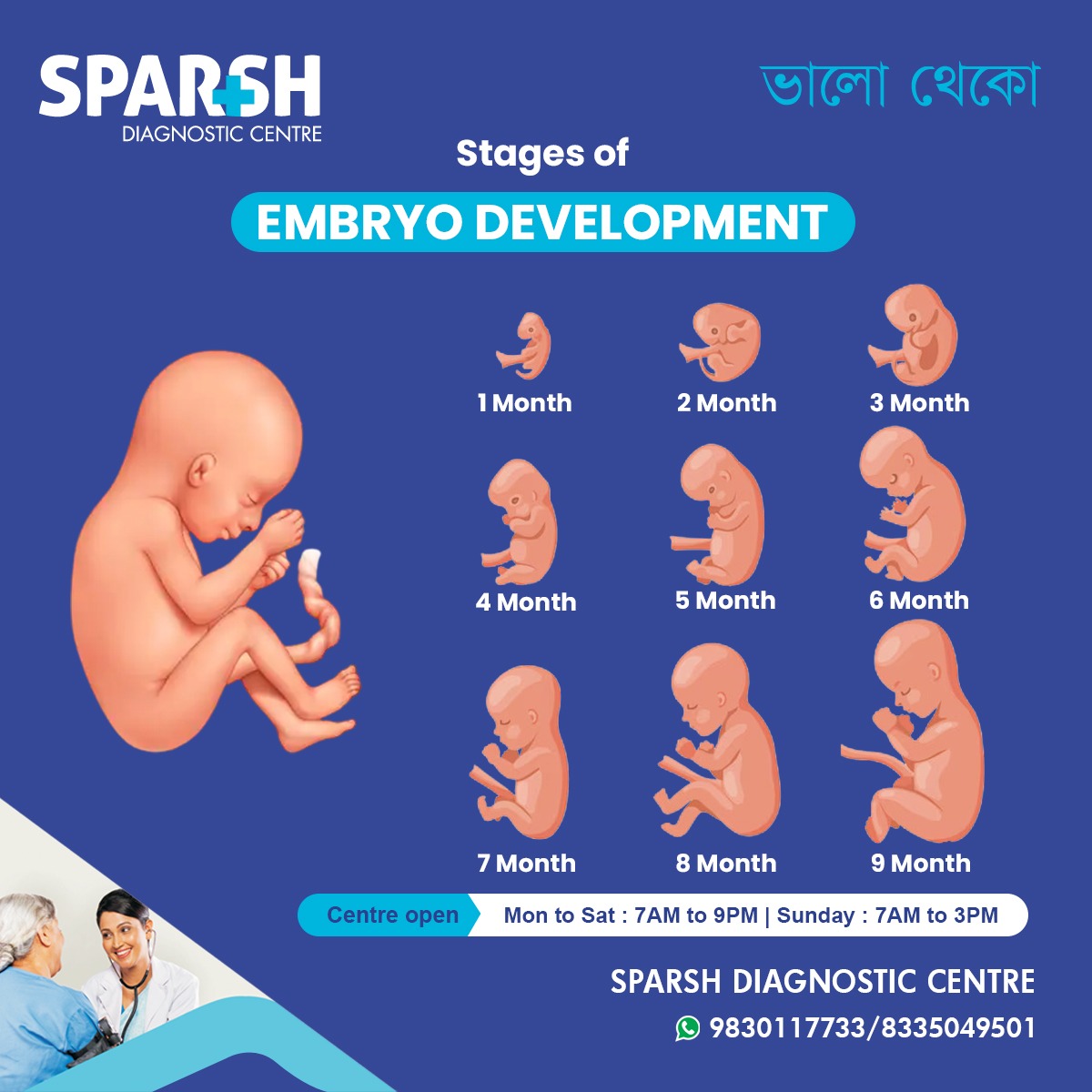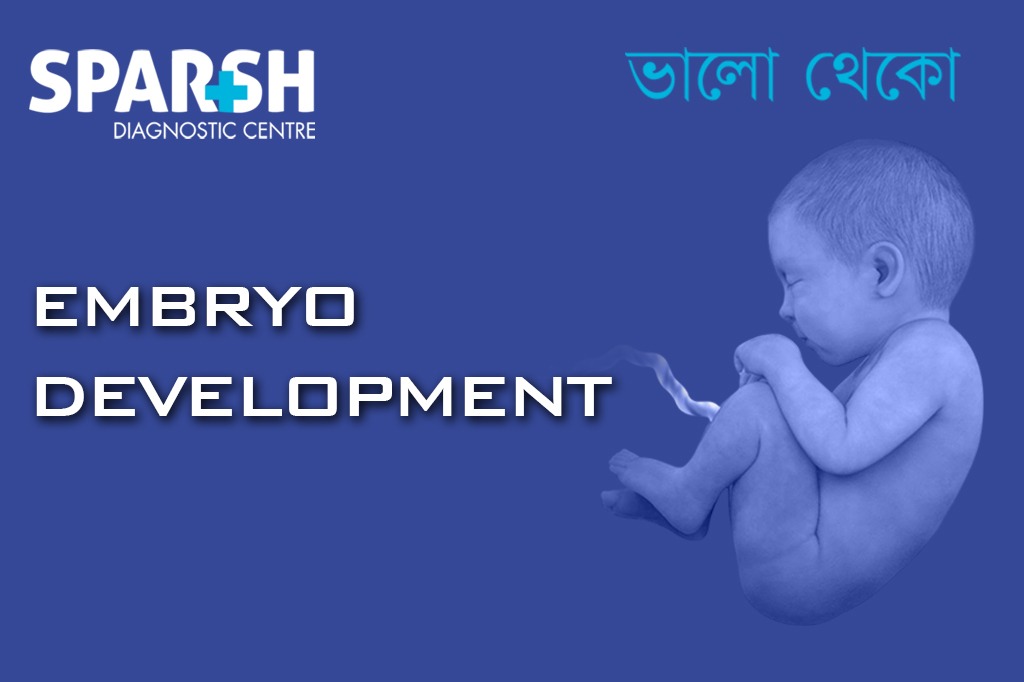Pregnancy is a remarkable journey that begins with a single fertilized cell and culminates in the birth of a fully developed baby. The process of embryo development unfolds in stages, each marked by intricate changes and rapid growth. Understanding these stages not only deepens our appreciation of human life but also empowers expectant parents to monitor their baby’s health with greater confidence.
In this detailed guide, we’ll explore the month-by-month stages of embryo development, discuss how prenatal diagnostics like ultrasound help track fetal progress, and explain the importance of early detection of developmental issues.
What Is Embryo Development?
Embryo development refers to the biological process that transforms a fertilized egg (zygote) into a multi-cellular organism. This process includes cell division, tissue formation, and organ development, typically categorized by trimesters or monthly milestones. The early part of this development is known as the embryonic stage (weeks 1–8), followed by the fetal stage (week 9 to birth).
Month-by-Month Stages of Embryo Development
Month 1: Fertilization and Implantation
Duration: Weeks 1 to 4
Key Events:
Fertilization of egg by sperm creates a zygote.
Zygote undergoes rapid cell division and forms a blastocyst.
Blastocyst implants itself in the uterine lining.
The amniotic sac, placenta, and umbilical cord begin to form.
Embryo Size: About the size of a poppy seed (~0.1 cm)
Clinical Insight: Blood tests and early ultrasounds can confirm pregnancy and estimate gestational age.
Month 2: Organogenesis Begins
Duration: Weeks 5 to 8
Key Events:
Heart begins to beat (usually detected by 6 weeks).
Brain, spinal cord, and major organs start forming.
Limb buds appear; facial features begin to take shape.
Neural tube closes, laying the foundation for the central nervous system.
Embryo Size: About 1.6 cm (size of a raspberry)
Clinical Insight: First-trimester ultrasound can check for fetal heartbeat and confirm implantation site.
Month 3: Transition to Fetus
Duration: Weeks 9 to 12
Key Events:
Embryo officially becomes a fetus.
Arms, hands, fingers, feet, and toes become well-formed.
Bones begin to harden.
External genitalia start forming.
Vital organs continue developing and begin functioning.
Fetus Size: Around 7.6 cm (size of a plum)
Clinical Insight: Nuchal translucency scan may be performed between weeks 11–14 to screen for chromosomal abnormalities.
Second Trimester: Rapid Growth and Refinement
Month 4: Facial Features and Movement
Duration: Weeks 13 to 16
Key Events:
Facial features are more defined.
Baby can make sucking motions and may begin to swallow.
Nervous system begins functioning.
Gender may be detectable on ultrasound.
Fetus Size: About 13 cm (size of an avocado)
Clinical Insight: Many women begin to show visible signs of pregnancy by the end of this month.
Month 5: Quickening
Duration: Weeks 17 to 20
Key Events:
Fetal movements (“quickening”) are often felt by the mother.
Hair, eyebrows, and eyelashes appear.
Skin is covered with a waxy coating (vernix caseosa).
Organs continue to mature.
Fetus Size: About 25 cm (size of a banana)
Clinical Insight: The anomaly scan (mid-pregnancy ultrasound) is typically performed around 20 weeks to examine the baby’s anatomy in detail.
Month 6: Responsive to Stimuli
Duration: Weeks 21 to 24
Key Events:
Baby can respond to sounds and light.
Eyelids can open and close.
Lung development continues but isn’t fully complete.
Taste buds form.
Fetus Size: About 30 cm (size of an ear of corn)
Clinical Insight: This is a critical period for detecting structural anomalies and ensuring that fetal growth is on track.
Third Trimester: Maturation and Preparation for Birth
Month 7: Viability Outside the Womb
Duration: Weeks 25 to 28
Key Events:
Baby develops more body fat.
Hearing is fully developed.
Brain and nervous system continue maturing.
Organs are better equipped for life outside the womb.
Fetus Size: About 36 cm (size of a large eggplant)
Clinical Insight: Premature babies born at this stage may survive with intensive medical care.
Month 8: Final Growth Surge
Duration: Weeks 29 to 32
Key Events:
Baby gains weight rapidly.
Lungs and other vital organs are nearly fully developed.
Stronger kicks and movements are felt.
The body begins to position head-down in preparation for birth.
Fetus Size: Around 41 cm (size of a pineapple)
Clinical Insight: Regular checkups, non-stress tests, and fetal monitoring become more frequent in this stage.
Month 9: Full-Term Baby
Duration: Weeks 33 to 40
Key Events:
Organs are fully developed and functioning.
Baby continues to gain weight and builds immunity.
Movements may decrease due to limited space.
Labor signs such as lightening (baby drops lower) may begin.
Fetus Size: 45–51 cm (size of a watermelon)
Clinical Insight: A full-term pregnancy is considered 37–40 weeks. Delivery may occur any time in this period.

Importance of Prenatal Diagnostics in Embryo Development
At each stage of development, diagnostic imaging and screening tests play a vital role in ensuring a healthy pregnancy. Key tools include:
1. Ultrasound Scans
First Trimester: Confirms pregnancy and gestational age.
Second Trimester: Evaluates fetal anatomy.
Third Trimester: Assesses fetal growth, position, and amniotic fluid levels.
2. Blood Tests
Detect chromosomal abnormalities (e.g., Down syndrome).
Monitor hormone levels and maternal health.
3. Amniocentesis and Chorionic Villus Sampling (CVS)
Recommended for high-risk pregnancies to check for genetic disorders.
Common Concerns During Embryo Development
Even with a healthy pregnancy, certain complications may arise, such as:
Miscarriage (spontaneous abortion) – more common in the first trimester.
Ectopic pregnancy – embryo implants outside the uterus.
Gestational diabetes and preeclampsia – require monitoring and management.
These conditions underscore the importance of regular antenatal check-ups and a supportive care team.
How Sparsh Diagnostic Centre Supports Pregnancy Care
At Sparsh Diagnostic Centre, we offer a full suite of prenatal diagnostic services to track your baby’s growth and ensure your health throughout pregnancy:
Early Pregnancy Scans
Fetal Well-being Assessments
Blood Investigations and Hormonal Panels
Our expert radiologists and gynaecologists provide personalized care backed by modern equipment and years of experience.
📍 Centre Timings:
Mon to Sat – 7 AM to 9 PM
Sunday – 7 AM to 3 PM
📞 Contact Us: 9830117733 / 8335049501
Embryo development is a breathtakingly intricate process that reflects the miracle of life. From a tiny cell to a full-term baby, each stage plays a crucial role in forming a healthy, thriving child. By staying informed and choosing reliable diagnostic care, parents can ensure the safest possible journey for their baby.
If you’re expecting or planning to conceive, let Sparsh Diagnostic Centre be your trusted partner in this beautiful phase of life.
#BhaloTheko
Disclaimer:
No content on this site, regardless of date, should ever be used as a substitute for direct medical advice from your doctor or other qualified clinician.

![]()





